I'm using ISE Project Navigator 14.7 with a Xilinx XC95144XL-5TQ100C CPLD in conjunction with a LM1881 video sync separator. I've also got a 14.3 MHz clock. I'm trying to generate VSYNC pulses in response to the LM1881 FIELD line changing (and yes, I know the LM1881 also has a VSYNC output; but I'm constrained due to the PCB I'm using which only allows me to view FIELD).
Here is the code I am using to generate the VSYNC signal (I tried to remove non-relevant parts):
library IEEE;
use IEEE.STD_LOGIC_1164.ALL;
use IEEE.NUMERIC_STD.ALL;
entity outputGenFromLm1881 is
Port ( clock14_3 : in STD_LOGIC;
lm1881Field : in STD_LOGIC;
vsync2_prime : out STD_LOGIC);
end outputGenFromLm1881;
architecture Behavioral of outputGenFromLm1881 is
constant cyclesPerVsync : natural := 238875;
constant cyclesPerHalfLine : natural := 455;
constant cyclesPerLine : natural := cyclesPerHalfLine*2;
constant cyclesPerVsync2Pulse : natural := ((cyclesPerLine * 11)/2);
-- we need 18 bits for range of vsync plus an extra bit to detect/prevent wrapping back to 0
signal iVsync2Count : std_logic_vector(18 downto 0) := (others => '0');
signal fieldOld : std_logic := '0';
begin
vsync2_prime <= '0' when (unsigned(iVsync2Count) < cyclesPerVsync2Pulse) else '1';
lm1881FieldThink: process(clock14_3)
begin
if (rising_edge(clock14_3)) then
-- if field has changed
if (lm1881Field /= fieldOld) then
iVsync2Count <= (others => '0');
fieldOld <= not fieldOld;
-- we never want to wraparound back to 0 unintentionally
elsif (iVsync2Count(18) = '0') then
iVsync2Count <= std_logic_vector(unsigned(iVsync2Count) + 1);
end if;
end if;
end process lm1881FieldThink;
Most of the time it behaves correctly as shown here:

But occasionally, the counter never resets even though fieldOld is getting changed properly.

There's nothing else that modifies iVsync2Count except this process so I'm thinking somehow the section of the process that increments iVsync2Count is taking precedence over the reset. The trouble is I can't see how this is possible or how to fix it.
Can anyone explain why iVsync2Count sometimes does not get properly reset?